8 Best Ways To Protect Your Hair From Hard Water
Take preventative measures to ensure the minerals in water do not harm your mane.
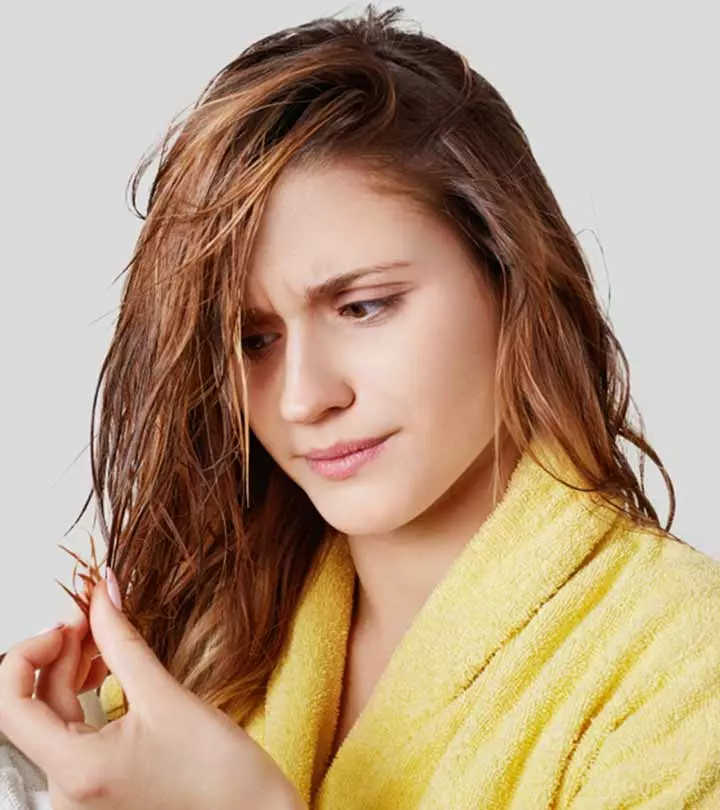
Image: Shutterstock
What does hard water do to your hair? How to protect your hair from hard water? Hair loss is a problem that affects people all over the globe. We frequently switch shampoos or buy hair care products in the hope of decreasing hair loss. But most of the time, we do not consider the water quality we use to rinse our hair and simply avoid making any changes.
Hard water contains too much magnesium, calcium, and iron that can weaken and damage your hair, causing significant hair loss. However, the consequences of hard water on hair can be rectified. Continue reading to learn how hard water may affect your hair and what you can do to make it healthy again and maintain proper hydration levels for lustrous tresses.
In This Article
What Is Hard Water And What Are Its Effects On Hair?
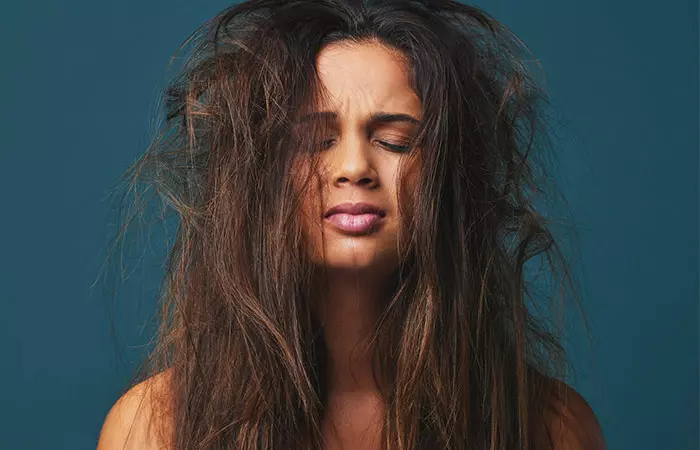
All types of water contain minerals. But hard water contains an excess of them. Researchers state that hard water contains 212.5 ppm of CaCO3 while soft water contains only 10 ppm of CaCO3 (1). Moreover, soap or shampoo do not lather well in hard water. The bicarbonates, chlorides, and sulfates of calcium and magnesium combine with soap and form salt precipitates. These can lead to the following hair issues:
- Greasy hair: Your hair will feel greasy and unclean due to the excessive mineral deposits that stick to the hair strands.
- Dull hair: These mineral deposits can make your hair look dull. They get trapped in the hair shaft and reduce hair shine.
- Rough and frizzy hair: The mineral deposits can make your hair rough and frizzy.
- Clogged pores: The minerals get deposited on the scalp and lead to clogged pores. They also can block the natural sebum. As a result, your hair starts to look dry and lifeless. Mineral deposits on the scalp also lead to scalp infections, dandruff, and scalp sensitivity.
- Split ends: The mineral deposits on the scalp and the hair shaft also lead to split ends.
A lifestyle blogger talks about her experience trying the no-poo method for healthier hair, which started out fine until she realized the water was making her scalp waxy. “I realized that this waxy residue would by no means disappear as it formed due to the fact that I washed my hair with hard water. Unfortunately, I did not have access to soft water, and I would have to buy an expensive water filter to soften it (filters that only remove chlorine, for example, will not soften the water). So I slowly abandoned this method and focused on finding something that would work even with my hard water (i),” she says.
 Trivia
TriviaThe most distressing side effect of hard water could be hair loss. Why would you lose so much hair? Let us understand the same in the following section.
Key Takeaways
- The minerals in hard water might alter the effectiveness of hair care products, making it more challenging to get the intended results.
- You can install a water softening system or use a shower filter to reduce the minerals in the water.
- You can also start using chelating shampoos as they help remove dirt, product build-up and mineral deposits (an issue when using hard water) from your scalp and hair, helping it breathe.
- If you want natural options then apple cider vinegar and lemons can lower mineral build-up too.
The Science Behind Hard Water And Hair Fall
Hard water contains several minerals and oxidizers like copper, magnesium, calcium, and iron
. These minerals and oxidizers are positively charged while the hair is negatively charged. A positively charged oxidizer or mineral and negatively charged hair attract each other. This phenomenon reduces hair strength and leads to hair fall.
Interestingly, while certain research studies state that hard water could reduce hair’s tensile strength, another study shows no relationship between hard water and hair tensile strength or elasticity (1), (2). However, various studies link hard water to skin diseases and irritation (3), (4). Therefore, if you live in an area with hard water, you will see its effects on your hair and skin. It also could cause hair loss. But would this hair loss be permanent? Let us understand the same in the following section.
Does Hard Water Cause Permanent Hair Loss?
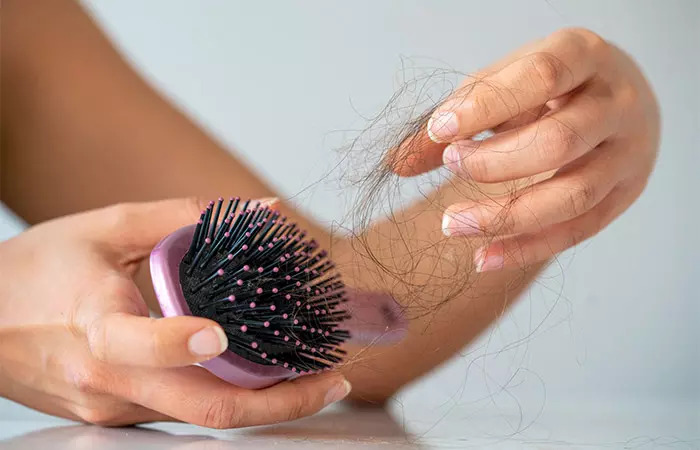
Hard water only causes temporary hair loss (also known as hair shedding). You can reduce this hair shedding by simply changing the water you use to wash your hair. If that is not possible, there are other ways you can reduce the mineral content in hard water and decrease your hair loss.
How To Reverse Hair Loss Due To Hard Water?
- Install A Water Softening System
A water softening system works by replacing the calcium and magnesium ions in hard water with sodium ions, reducing mineral buildup on your hair and scalp. Install a water softener to directly use tap water to wash your hair. Over time, this helps prevent dryness, breakage, and dullness, promoting healthier hair. Additionally, using softened water can reduce the need for costly hair treatments and conditioners, leading to potential long-term savings on hair care products.
- Use A Shower Filter
A shower filter improves water quality by filtering out the excessive minerals in the water. It also reduces water hardness. It is an affordable device and can be detached from the shower head to be cleaned. Replace the filter every six months.
 Quick Tip
Quick Tip- Use A Chelating Shampoo
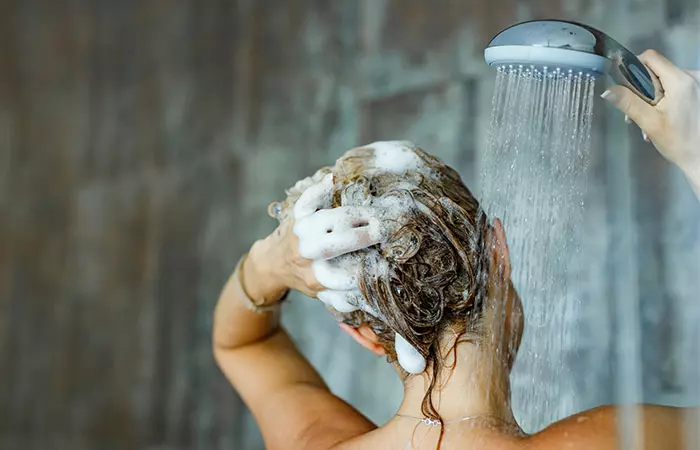
Chelating shampoos help remove all traces of dirt, mineral deposits, and product build-up. If you live in an area with hard water, it is always a good idea to use a chelating shampoo instead of a regular one to remove mineral build-up. Chelating shampoos also keep your scalp and hair cleansed, light, and breathable.
- Use Apple Cider Vinegar
Apple cider vinegar helps reduce mineral build-up. You can mix one teaspoon of apple cider vinegar with one mug of water. Rinse your hair with it to get rid of the mineral deposits.
- Use Lemon Rinse
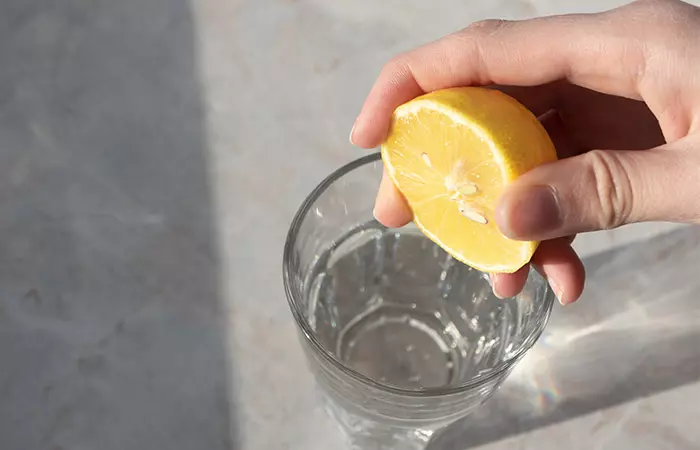
Mix one tablespoon of lemon juice with a mug of water. Use this water to give your hair a final rinse before towel drying your hair. Use this rinse after you shampoo and condition your hair.
- Use A Hair Mask
Use a deep conditioning hair mask for hard water hair treatment every once a week to keep your hair healthy. You can make a hair mask with avocado or mix coconut oil and rosehip oil. Apply the mask to your scalp and hair strands. Wash the mask off after 45 minutes with a chelating shampoo (or use a shower filter if you want to use a mild shampoo).
- Use Purified Bottled Water
You can use purified bottled water as a final rinse for your hair. This can help prevent mineral buildup, preserve your hair’s natural softness and shine, and reduce the need for harsh clarifying shampoos and treatments to some extent.
- Use Club Soda
Using club soda for hair may sound uncommon, but it may protect your hair from the adverse effects of hard water. According to anecdotal evidence, its slightly acidic nature helps neutralize the mineral buildup caused by hard water, leaving your hair smoother and softer. Simply rinse your hair with club soda after regular shampooing and conditioning. Do not rinse with water afterward.
Infographic: DIY Hard Water Shampoo Recipe
Hard water contains an excess amount of minerals that can lead to clogged pores, greasy hair, and temporary hair loss. To combat this issue and improve hair health, you can use a hard water shampoo. Instead of buying commercial shampoos and conditioners, you can make one at home.
Check out the infographic below to know more! Illustration: StyleCraze Design Team
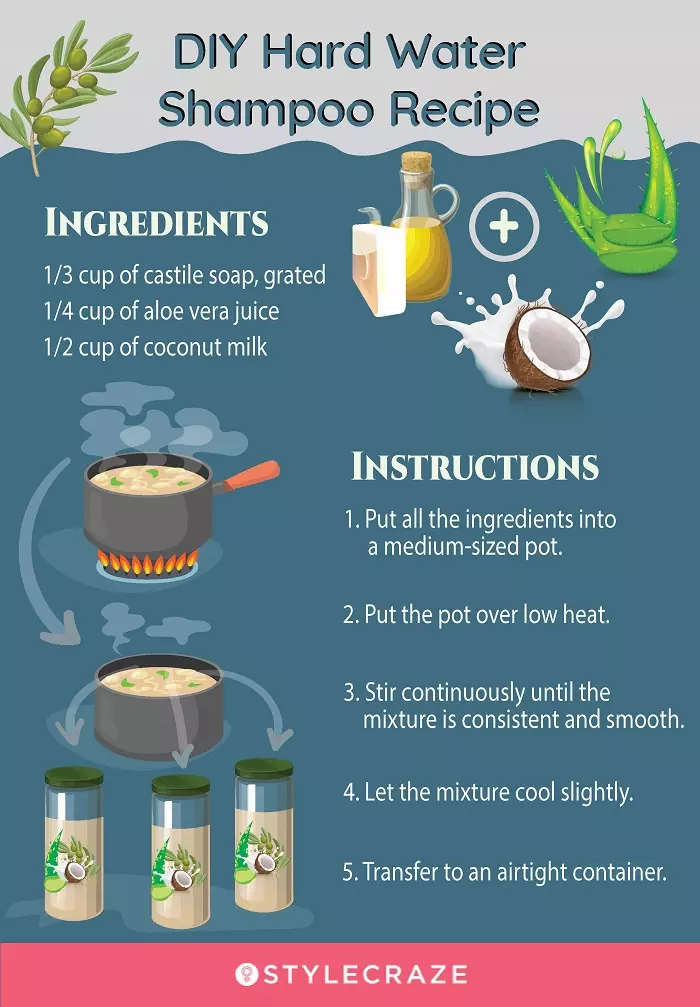
Hard water contains minerals and oxidizers that weaken your hair, leading to hair fall and exacerbating damaged hair. When the positively charged mineral and oxidizers attract to the negatively charged hair, the hair becomes weak, resulting in hair loss. Thus, excess minerals in water can make your hair rough, dry, and more prone to thinning and shedding. Following the treatments discussed above may help you know how to protect your hair from hard water. However, hard water hair loss is not permanent. You can stop this by changing the water you use to wash your hair or reducing the mineral content in the water.
Frequently Asked Questions
Hard water vs. soft water – which is better for your hair?
Soft water is better for hair. Hard water contains excess calcium, magnesium, and iron. Their positive charge attracts hair (which is negatively charged) and results in hair shedding. Mineral deposits in hard water also make the hair dull, rough, and dry.
Can hard water cause hair thinning?
Yes, hard water can cause hair thinning. It can block the scalp pores. Its positively charged minerals can also attract negatively charged hair and cause hair thinning.
How often should I use a chelating shampoo?
To maintain the health of your hair without over-drying it, it’s recommended to use a chelating shampoo once or twice a month. This frequency effectively removes mineral deposits, keeping your hair clean and healthy.
Does hard water make your hair curly?
Hard water makes your hair messy. Your hair will feel greasy, no matter how many times you wash it. Hard water will dry up the hair strands, strip away the moisture and make hair look frizzy and lifeless.
Which shampoo is best for hard water?
A chelating shampoo is best for hard water. Chelating shampoos help remove mineral deposits, dirt, and product build-up.
Does baking soda reduce water hardness?
Yes, research suggests that adding a small concentration of baking soda to water may help soften water. However, adding baking soda in large quantities may increase its pH level which may cause frizzy and rough hair (5).
Does Epsom salt reduce water hardness?
Yes, studies suggest that Epsom salt helps lower water hardness by breaking down the calcium and magnesium ions in hard water (6)
Can hard water make your hair smell?
Yes, hard water might make your hair smell like rotten eggs.
Illustration: Best Ways To Protect Your Hair From Hard Water
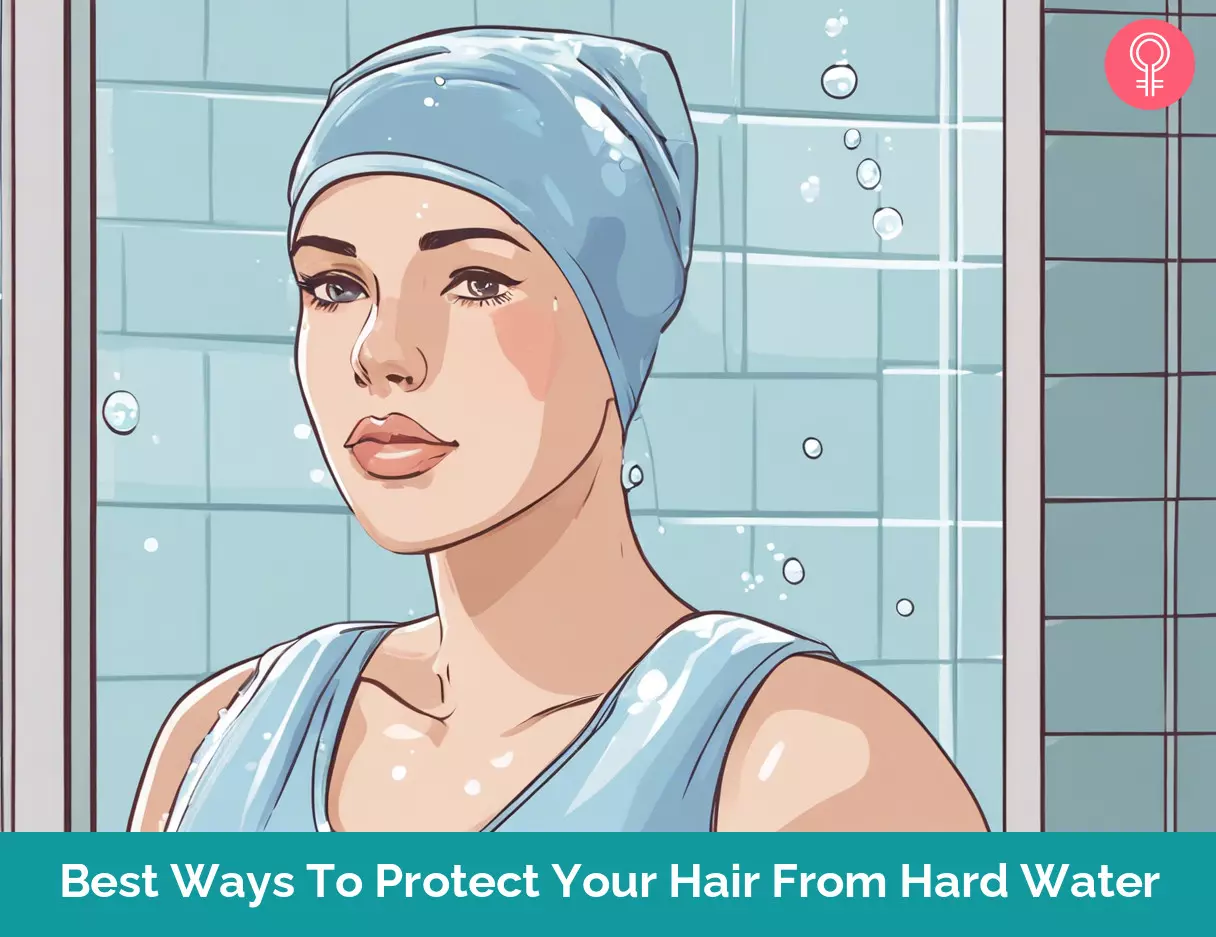
Image: Stable Diffusion/StyleCraze Design Team
References
Articles on StyleCraze are backed by verified information from peer-reviewed and academic research papers, reputed organizations, research institutions, and medical associations to ensure accuracy and relevance. Read our editorial policy to learn more.
- Effects of Hard Water on Hair.
https://www.ncbi.nlm.nih.gov/pmc/articles/PMC3927171/ - Effect of topical application of hard water in weakening of hair in men.
https://pubmed.ncbi.nlm.nih.gov/27654734/ - The Effect of Water Hardness on Surfactant Deposition after Washing and Subsequent Skin Irritation in Atopic Dermatitis Patients and Healthy Control Subjects.
https://pubmed.ncbi.nlm.nih.gov/28927888/ - The influence of hard water (calcium) and surfactants on irritant contact dermatitis.
https://pubmed.ncbi.nlm.nih.gov/9118628/ - A Localized Study on Reducing Total Dissolved Solids Present in Southern California Tap Water.
https://assets.researchsquare.com/files/rs-139479/v1_covered.pdf?c=1631850592 - Pharmaceutical Influences of Epsom Salts, American Journal of Pharmacology and Pharmacotherapeutics.
https://www.imedpub.com/articles/pharmaceutical-influences-of-epsom-salts.php?aid=23254
Read full bio of Dr. Shruti Chavan
Read full bio of Arshiya Syeda
Read full bio of Anjali Sayee
Read full bio of Monomita Chakraborty







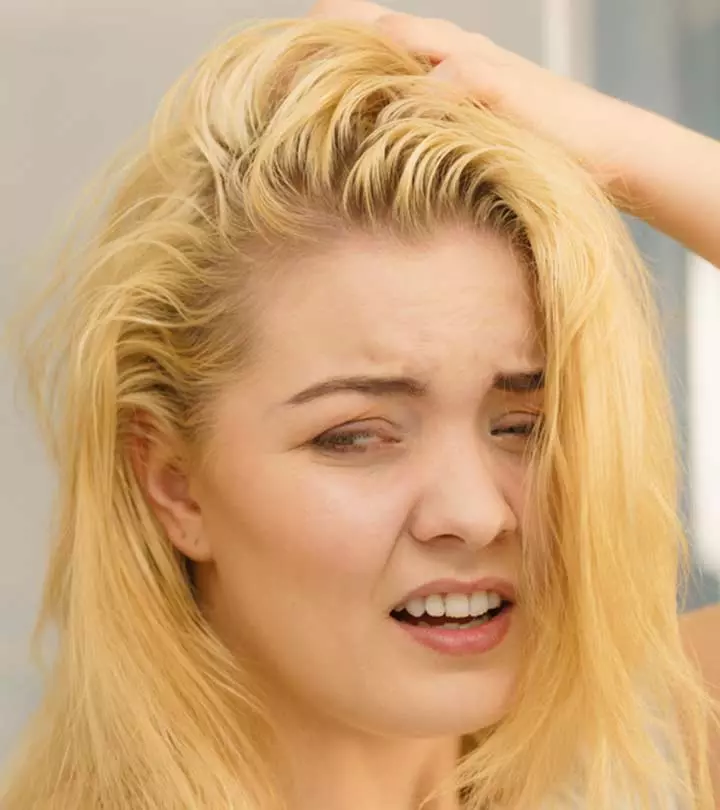
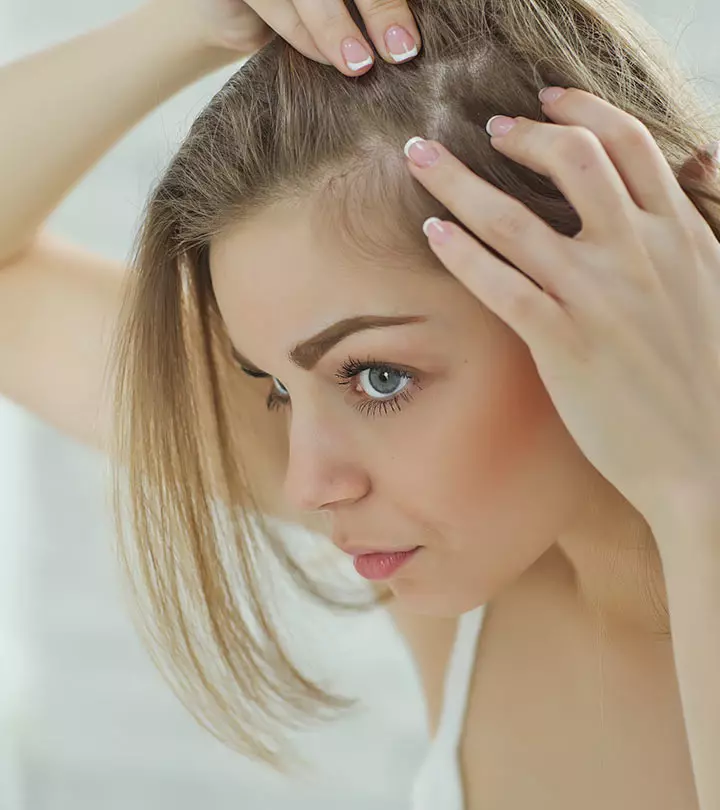

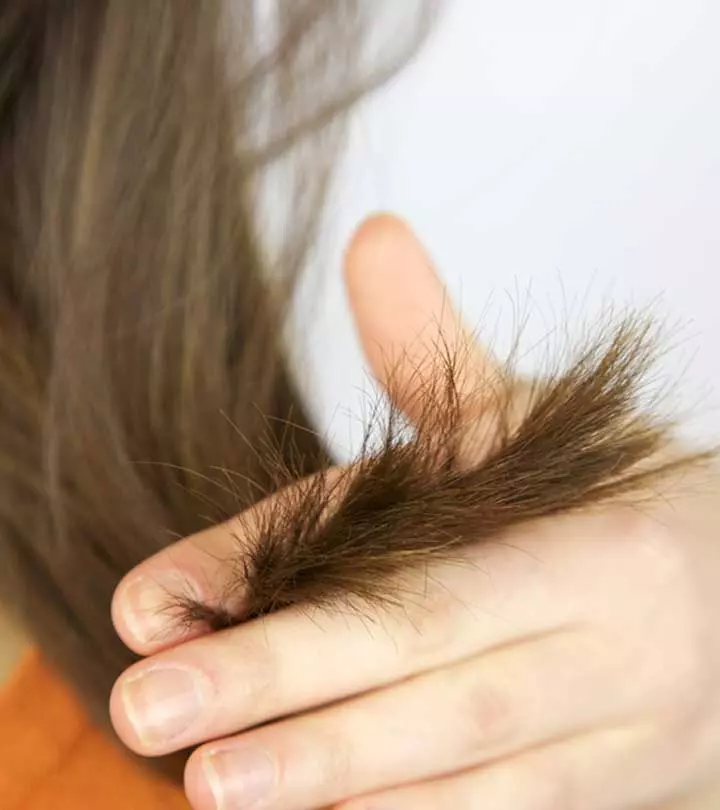
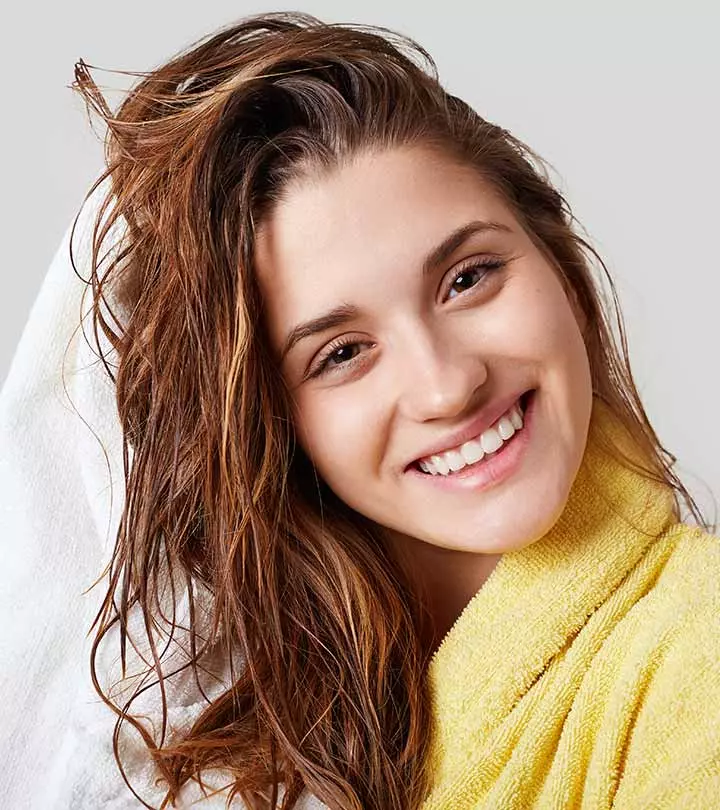
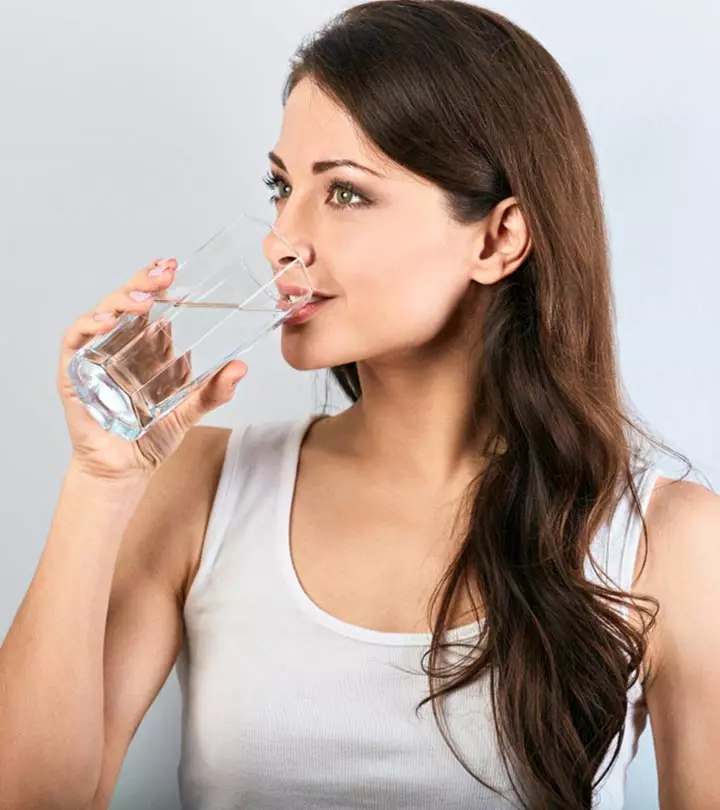
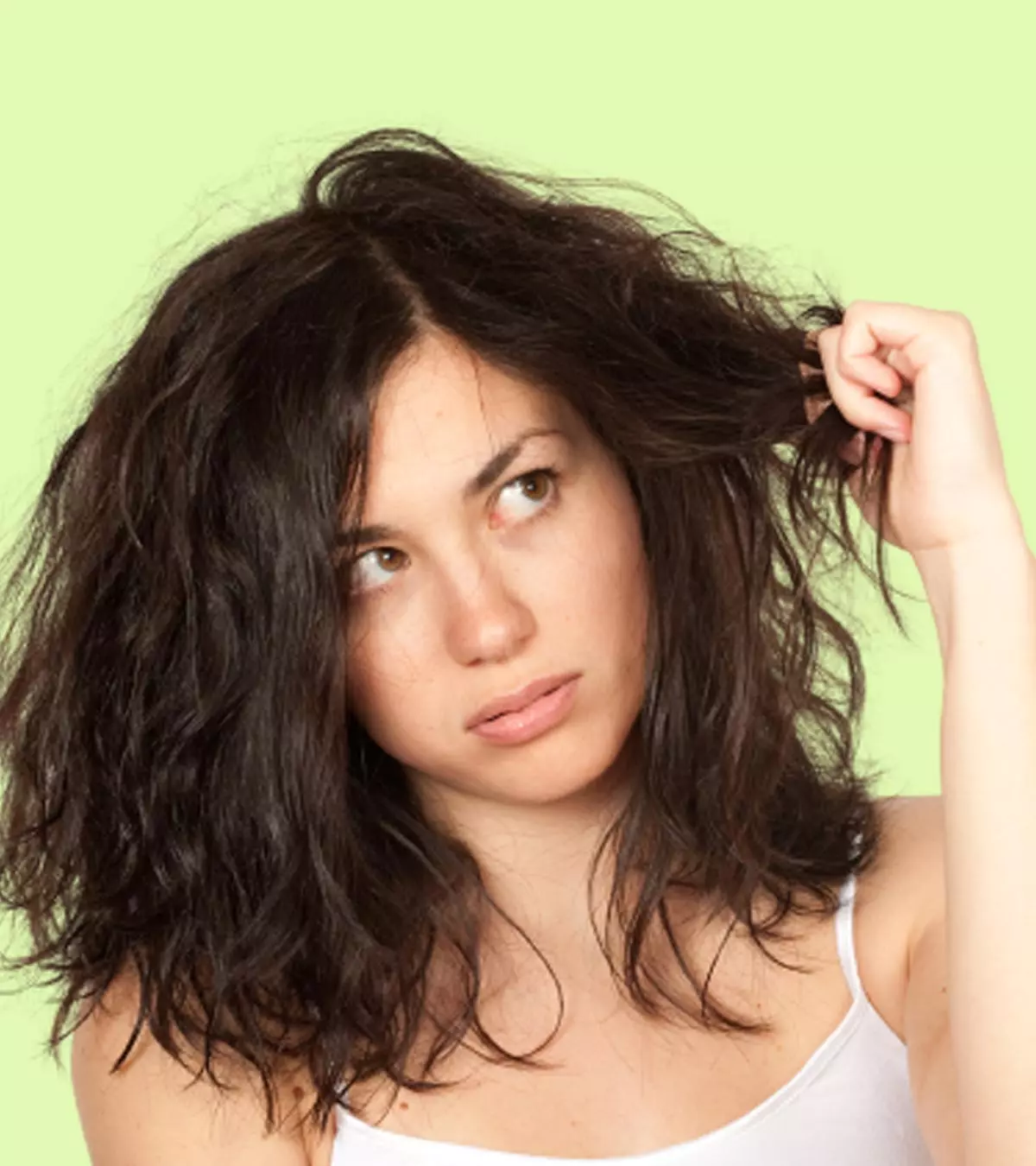
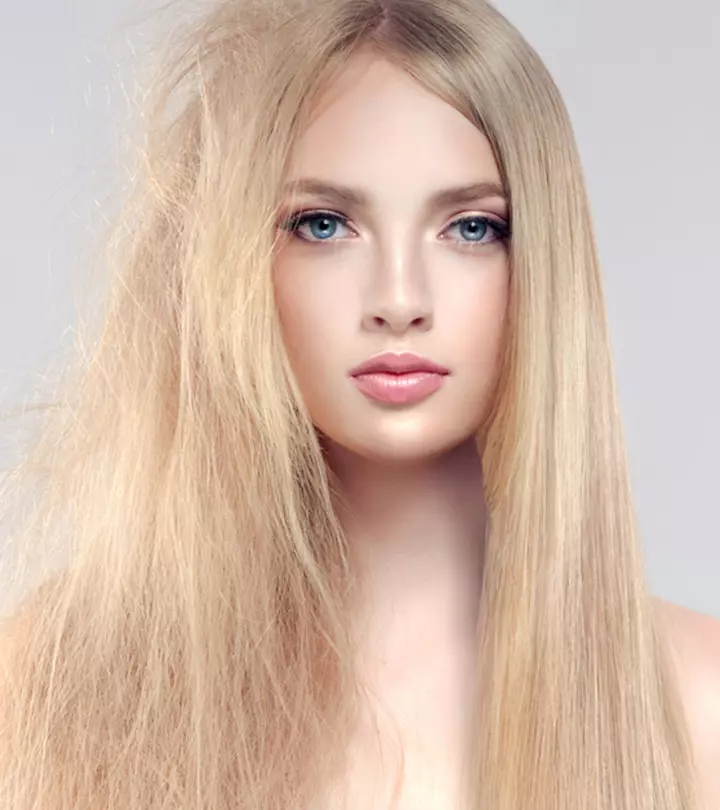
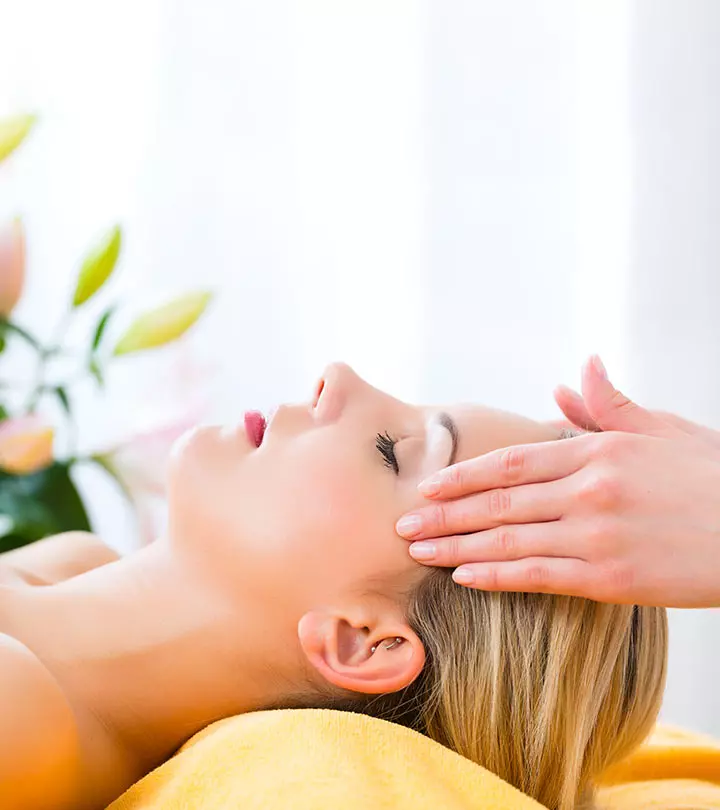
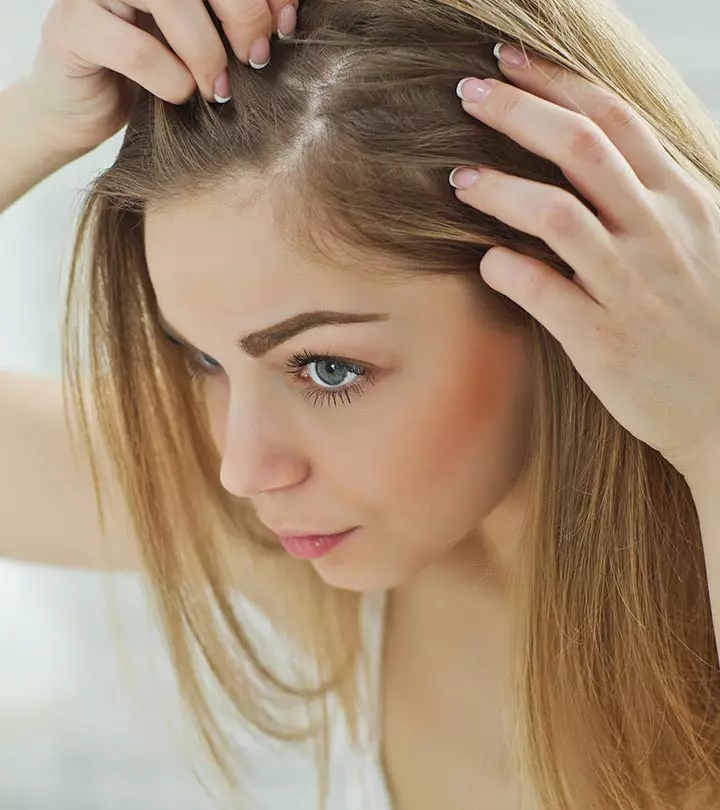
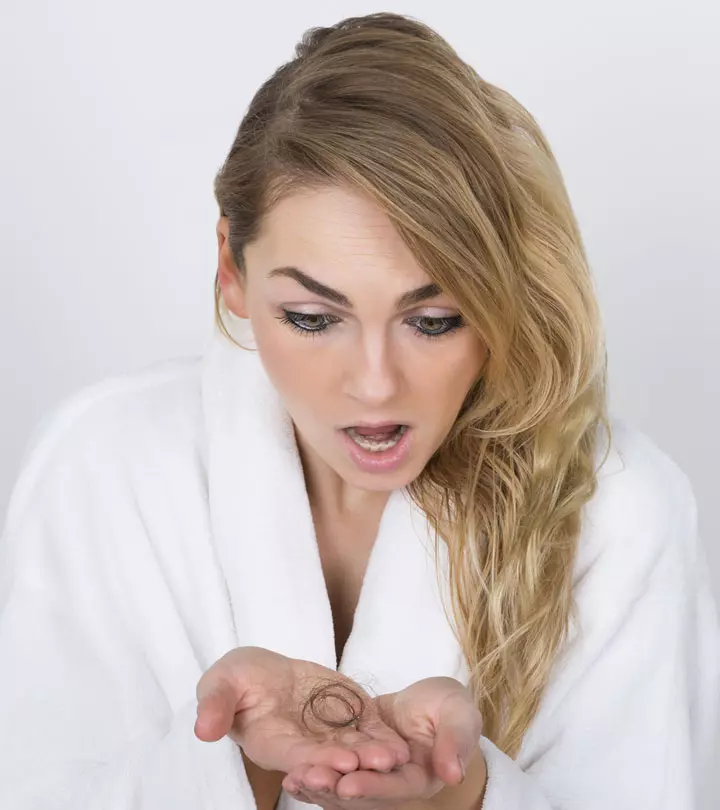
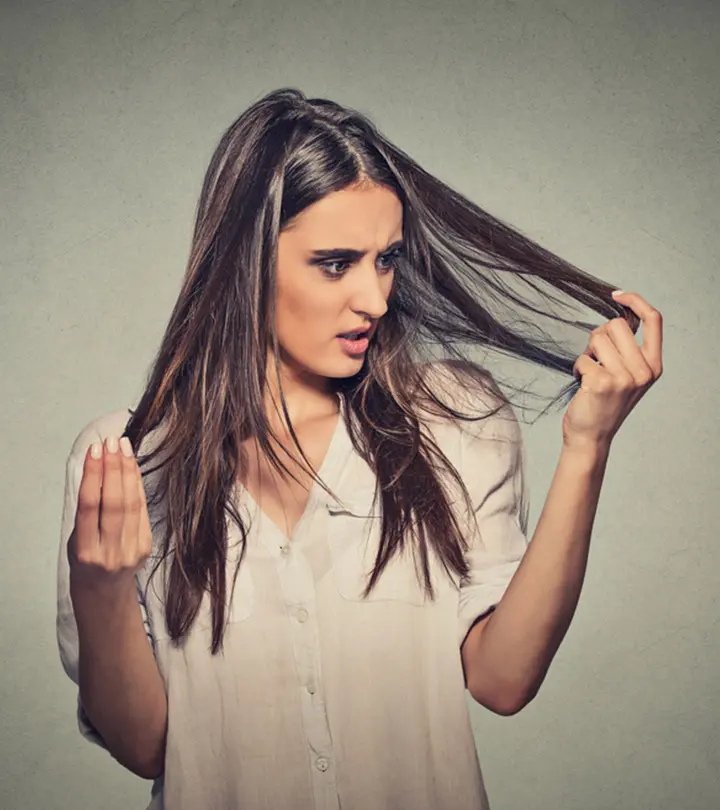
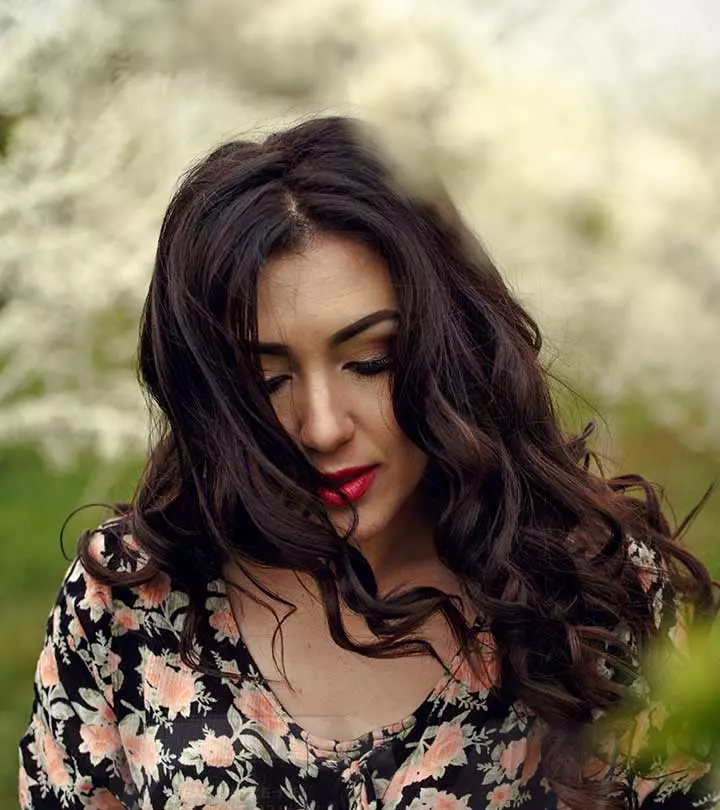
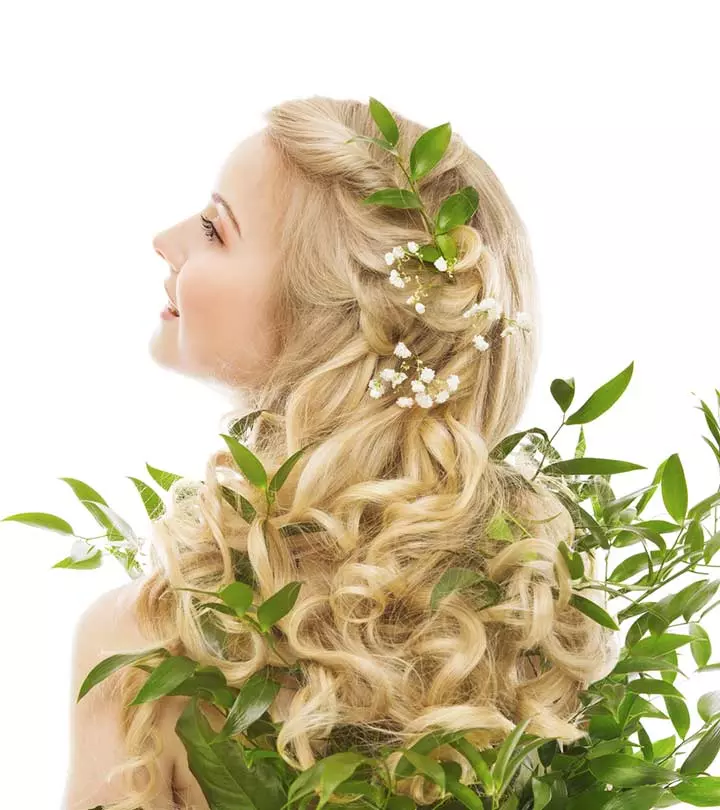
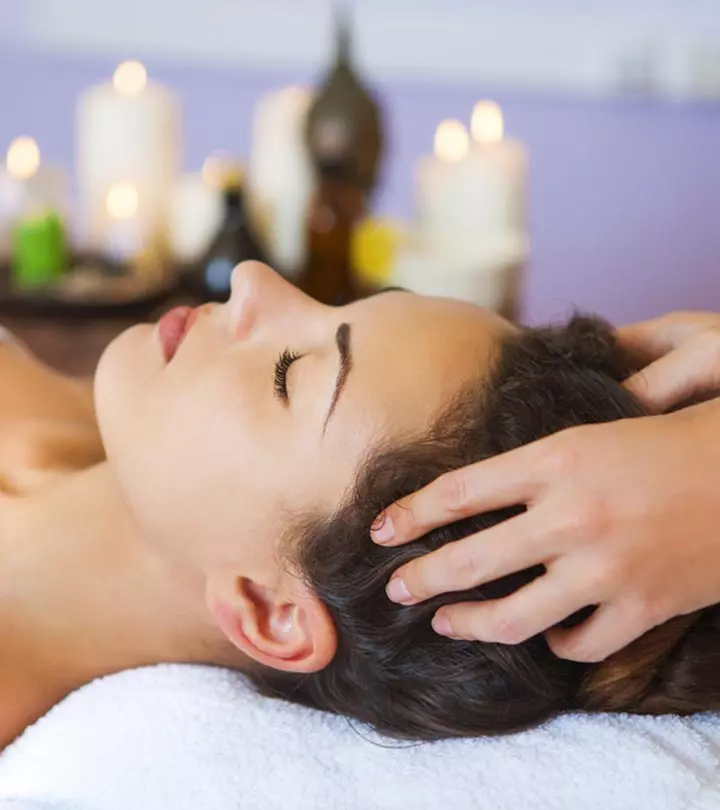

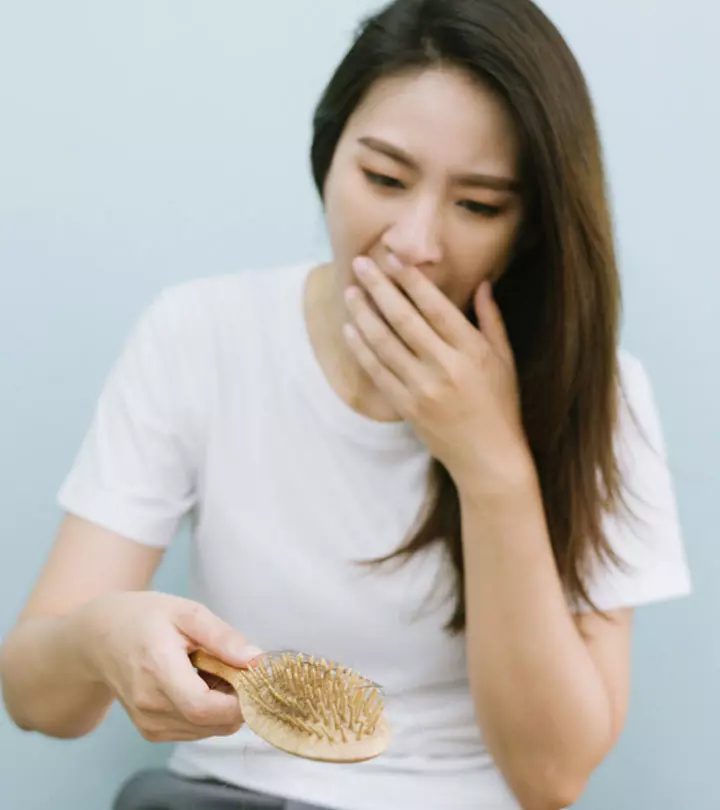
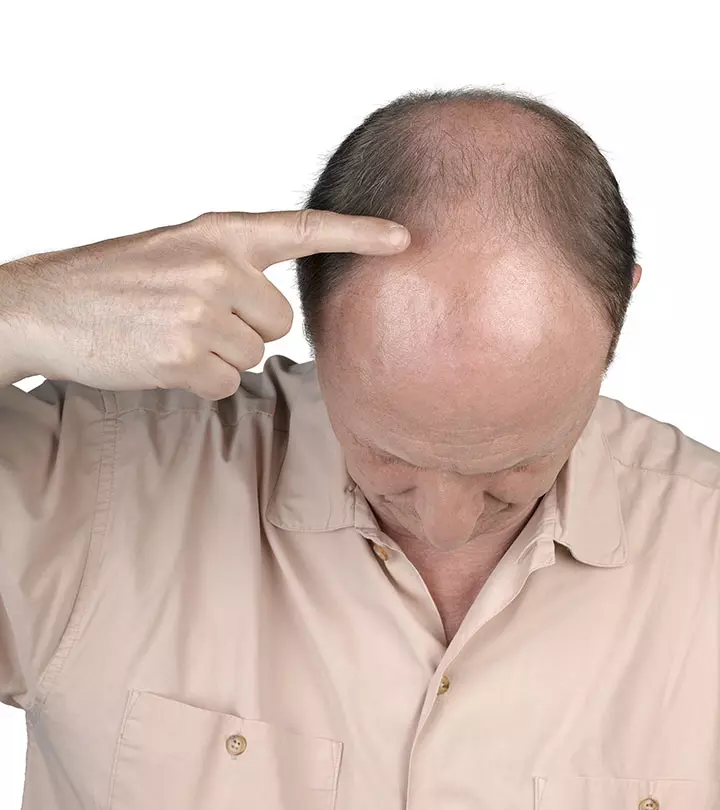
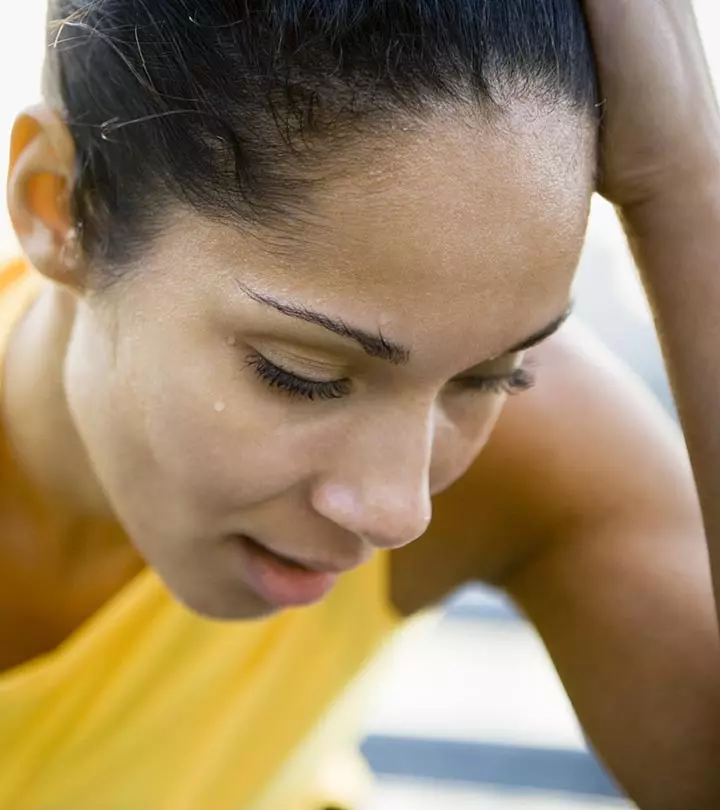
Community Experiences
Join the conversation and become a part of our empowering community! Share your stories, experiences, and insights to connect with other beauty, lifestyle, and health enthusiasts.